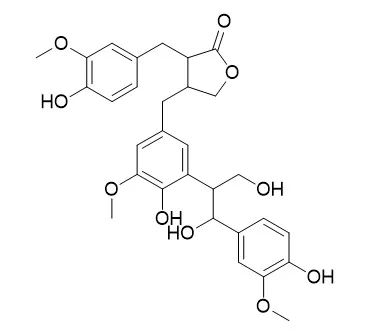Arctium lappa is a well-known traditional medicinal plant in China (TCM) and Europe that has been used for thousands of years to treat arthritis, baldness or cancer. The plant produces lignans as secondary metabolites, which have a wide range of bioactivities. Yet, their antiaging potential has not been explored.
METHODS AND RESULTS:
In this study, we isolated six lignans from A. lappa seeds, namely arctigenin, matairesinol, arctiin, (iso)lappaol A, Lappaol C, and lappaol F. The antioxidant and antiaging properties of the isolated lignans were studied using Caenorhabditis elegans as a relevant animal model. All lignans at concentrations of 10 and 100 μM significantly extended the mean life span of C. elegans. The strongest effect was observed with matairesinol, which at a concentration of 100 μM extended the life span of worms by 25%. Additionally, we observed that five lignans are strong free radical-scavengers in vitro and in vivo and all lignans can improve survival of C. elegans under oxidative stress. Furthermore, the lignans can induce the nuclear translocation of the transcription factor DAF-16 and up-regulate its expression, suggesting that a possible underlying mechanism of the observed longevity-promoting activity of lignans depends on DAF-16 mediated signaling pathway.
CONCLUSIONS:
All lignans up-regulated the expression of jnk-1, indicating that lignans may promote the C. elegans longevity and stress resistance through a JNK-1-DAF-16 cascade. Our study reports new antiaging activities of lignans, which might be candidates for developing antiaging agents. |






 Cell. 2018 Jan 11;172(1-2):249-261.e12. doi: 10.1016/j.cell.2017.12.019.IF=36.216(2019)
Cell. 2018 Jan 11;172(1-2):249-261.e12. doi: 10.1016/j.cell.2017.12.019.IF=36.216(2019) Cell Metab. 2020 Mar 3;31(3):534-548.e5. doi: 10.1016/j.cmet.2020.01.002.IF=22.415(2019)
Cell Metab. 2020 Mar 3;31(3):534-548.e5. doi: 10.1016/j.cmet.2020.01.002.IF=22.415(2019) Mol Cell. 2017 Nov 16;68(4):673-685.e6. doi: 10.1016/j.molcel.2017.10.022.IF=14.548(2019)
Mol Cell. 2017 Nov 16;68(4):673-685.e6. doi: 10.1016/j.molcel.2017.10.022.IF=14.548(2019)